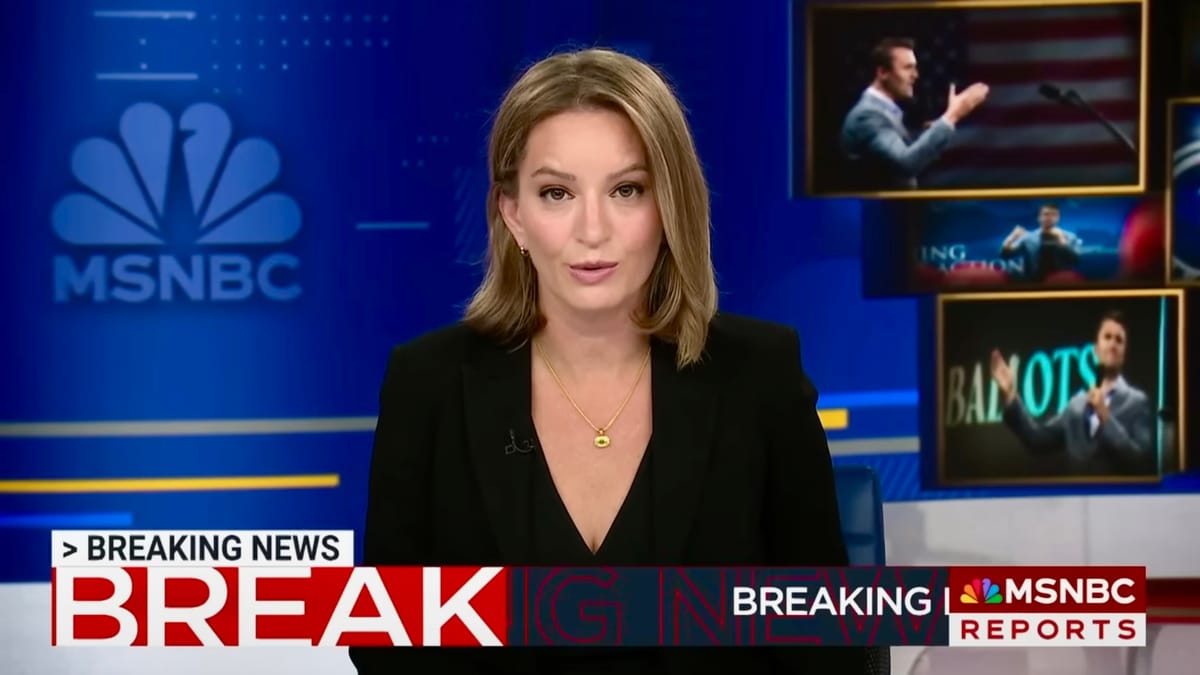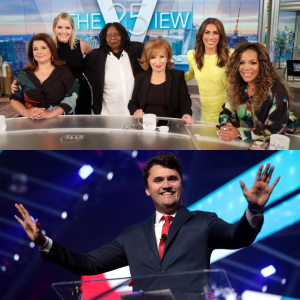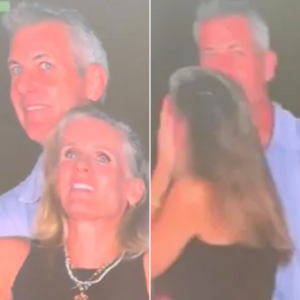The political world was already reeling from the shocking assassination of Charlie Kirk, the 31-year-old conservative leader and founder of Turning Point USA, but it was MSNBC anchor Katy Tur’s controversial remarks on air that truly set the internet on fire. During MSNBC’s live coverage of the incident, Tur suggested that Kirk’s death could be used as “justification” for political action, igniting a firestorm of outrage across the political spectrum.
As the backlash continues to grow, many are asking: Did Katy Tur cross the line with her comments? Or was she simply reflecting the inevitable politicization of a tragedy that has already fractured the nation?
The Comment That Sparked Outrage
During MSNBC’s live coverage, Tur made a statement that stunned viewers. While discussing the assassination of Charlie Kirk, she said, “We can’t ignore that this death could be used as justification for further political actions.” Her words, delivered with an unsettling sense of urgency, suggested that Kirk’s tragic death might be manipulated for political leverage.

Her comment immediately struck a nerve, with many accusing her of politicizing the tragedy. Critics on both sides of the political spectrum pointed out how inappropriate and insensitive it was to use a man’s assassination — one that had already divided the nation — as a talking point for future political action.
On social media, reactions were swift. One user tweeted, “Katy Tur just went too far. To politicize someone’s murder like this is disgusting and dangerous.” Another added, “This is why I can’t watch MSNBC anymore. The lack of respect for human life is staggering.” The hashtag #FireKatyTur quickly gained traction, and the call for accountability grew louder by the hour.
Political Fallout and MSNBC’s Responsibility
Tur’s remarks come at a time when tensions are already running high in American politics. Charlie Kirk’s assassination, executed with chilling precision, has already sparked outrage and suspicion. Yet, Tur’s comments seem to have amplified the controversy, making her statement not just a point of conversation, but the focal point of the media frenzy.
The larger question now is: What responsibility does MSNBC have in this situation? The network, known for its liberal leaning, has long been a target of conservative critics who argue that it often blurs the line between journalism and political commentary. With Tur’s comment, MSNBC faces mounting pressure to address the fallout. Will they defend her, or will they take action to distance themselves from such incendiary rhetoric?
One media analyst pointed out, “MSNBC has a history of controversial comments from its hosts, but this one crosses a line. At the very least, the network needs to clarify its stance on politicizing violence.”

So far, MSNBC has yet to issue a public statement, and Tur herself has remained silent on the controversy. The silence only adds fuel to the fire, with critics demanding that the network take swift action.
Public Reactions: A Nation Divided
As the debate rages, social media has become a battleground. The reactions have been deeply divided, with some seeing Tur’s comment as a legitimate acknowledgment of the way tragedy often shapes political narratives, while others view it as a gross misstep.
-
“Katy Tur is not wrong. We all know that this tragedy will be used for political gain, whether we like it or not,” wrote a liberal commentator, pointing out the hypocrisy of those criticizing Tur’s remark.
-
On the other side, many conservative voices argued that it was irresponsible for Tur to use such an event to advance a political agenda. “We can’t just let this kind of rhetoric slide. It’s dangerous and disrespectful to the memory of Charlie Kirk,” tweeted another user.
Even some of Tur’s usual supporters have expressed doubt, with one saying, “I’ve always liked Katy Tur, but this feels like too much. Some things should remain off-limits, and a man’s murder shouldn’t be one of them.”

The Larger Debate: Free Speech or Crossing the Line?
The controversy surrounding Tur’s comment has reignited a larger conversation about the role of media personalities in shaping public discourse. In an age where every comment is scrutinized and every opinion amplified, where should the line be drawn between free speech and responsible journalism?
For some, Tur’s comment was merely a reflection of the deepening polarization in American politics — a recognition that political violence is often seized upon for gain, regardless of the tragedy involved. But for others, it was a clear overstep, a reminder of how the media can often prioritize sensationalism over sensitivity, especially in the aftermath of a tragedy.
“It’s one thing to address the political implications of a tragic event, but it’s another to make a statement that could incite more division,” said Dr. Alan Whitmore, a political historian. “This is a moment for healing, not exploitation.”
What Will MSNBC Do Next?
As the backlash continues to grow, the clock is ticking for MSNBC. The network must decide whether to stand by its anchor, defend free speech, or take action to address the outcry.
With Tur’s controversial remarks already making headlines, MSNBC finds itself caught in the middle of a larger debate about the role of the media in shaping political narratives. Will they take responsibility for the tone of their coverage, or will they allow this incident to further fuel the flames of division in an already fractured media landscape?





